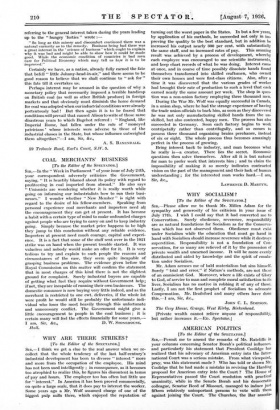WHY ARE THERE STRIKES ?
[To the Editor of the SPECTATOR.]
SIR,—I think we get a clue to the real answer when we re- collect that the whole tendency of the last half-century's industrial development has been to divorce " interest " more and more from the occupation of the employee. His mind has not been used intelligently ; in consequence, as it becomes too atrophied to realize this, he figures his discontent in terms of pay and hours. The employer too has often but little use for " interest." In America it has been proved commercially, on quite a large scale, that it does pay to interest the worker. Some years ago a Mr. Wolf assumed charge of one of the biggest pulp mills there, which enjoyed the reputation of
turning out the worst paper in the States. In but a few years, by application of his methods, he succeeded not only in ire. proving the quality to the best standard, but in addition he increased his output nearly 300 per cent. with substantially the same staff, and no increased rates of pay. This amazing result was achieved by a process of development, whereby each employee was encouraged to use scientific instruments, and keep chart records of what he was doing. Interest came at 'once, and in course of time possibly dissolute hands found themselves transformed into skilled craftsmen, who owned their own houses and were first-class citizens. Also, after a time it was discovered that the various grades of worker had brought their rate of production to such a level that each earned nearly the same amount per week. The shop in ques- tion was a non-union factory employing three thousand men.
During the War Mr. Wolf was equally successful in Canada, in a union shop, where he had the strange experience of having the trade union officials to back him, as soon as they discovered he was not only manufacturing skilled hands from the un- skilled, but also contented, happy men. The process has also succeeded in Germany. Soon each factory begins to work centripetally rather than centrifugally, and so comes to possess three thousand organizing brains perchance, instead of six or eight. The- whole process thus becomes amazingly perfect in the process of growing.
Bring interest back to industry, and man becomes what he really is—a creator. There lies the secret. Economic questions then solve themselves. After all it is but natural for man to prefer work that interests him ; and to claim the impossibility of making it so merely indicates contracted vision on the part of the management and their lack of human understanding ; for the interested man works hard.-1 am, Sir, &c., LAWRENCE D. MARTY?.1.






































 Previous page
Previous page